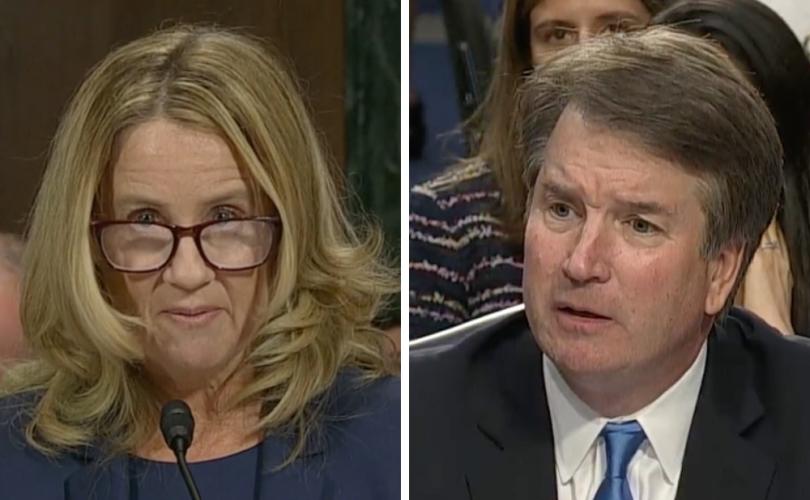Blog Post
How the Ford / Kavanaugh debacle complicated the fight against pornography
By Jonathon Van Maren
October 19, 2018 (LifeSiteNews) – I’ve been a part of the anti-porn movement for a few years now, and attending an anti-porn conference is always fascinating due to the sheer diversity of views that are present there on nearly every issue.
Nearly every corner of the ideological spectrum is represented in the war against pornography and sexual exploitation, and it is a rare thing to see, prefaced by the odd partnership of the Moral Majority’s Dr. Jerry Falwell and radical feminist Andrea Dworkin and now carried on by partnerships between fire-breathing lefties like Dr. Gail Dines and evangelicals like Josh McDowell, among many more.
The anti-porn movement is one of the very few places where common ground exists in the culture wars.
The Brett Kavanaugh confirmation hearings have threatened to change all of that, as my friend Josh Gilman of Strength to Fight (Canada’s only non-profit dedicated to fighting pornography) explained recently on my podcast. Our new era of hyper-partisanship and growing tribalism has also had an impact on the anti-porn movement—as Josh Gilman explained to me in our interview:
Van Maren: What does the anti-porn movement look like, for those that don’t know?
Gilman: The anti-porn movement is really special. I’ve never seen any movement where different activists and organizations are so invested in each others success. And it’s made up of incredibly diverse viewpoints, faiths, political factions. When you go to the Coalition to End Sexual Exploitation Summit, you’ll find Catholics, Mormons, and Evangelicals of every stripe. You’ll have atheist professors and feminist authors. Sweet grandmothers who are tougher than anyone else I’ve ever met, politicians risking their reputations to stick their neck out on these issues, and homeschooled mothers who just looked at what was happening and said: “enough is enough, I’ve got to do something.” And generally, everyone knows that we all have really different views on politics and faith and other hot-button issues, but as Matt Fradd said to kick off the 2016 summit “quarreling brothers get along when a maniac is at the door.” And in my experience, it’s absolutely true.
When I arrived at the 2018 summit in June, I think in the first 5 minutes I received hugs from a Catholic priest, an atheist speaker, Mormon author, Protestant politician, a Pentecostal activist and feminist blogger. And we were all genuinely delighted to see each other, share ideas, and fight together.
It sounds like the beginning of a bad joke “A priest, a feminist & a Mormon walk into a bar.”
Except this time it ends with “Because it was the only place open at the conference center and they were still passionately discussing how to protect children from pornography.”
Van Maren: How have these coalitions worked in the past?
Gilman: I think it starts at the top, so to speak. There have been ups and downs, but in the last few years especially, several very key people have made a point of working hard to bring people together. I’m sure I’m forgetting a few key ones but some of the ones who have been, in my opinion, crucial to the coalition’s success have been Dawn Hawkins of the National Coalition on Sexual Exploitation, Ron DeHaas of Covenant Eyes, Clay Olsen from Fight The New Drug and Gail Dines from Culture Reframed.
Some of them have been very public and outspoken in bringing people together, others have been more behind the scenes. But each of them has done a ton to help all the other smaller organizations. They and their staff are constantly providing other groups with resources and materials, taking phone calls from discouraged allies, providing advice and insight to new groups just starting. They’ve all set a strong tone of working across party lines and across faiths, so there has been a deep trust amongst all the different activists and organizations that everyone is invested in one thing. A more loving, less-pornified world.
This has spawned other smaller groups and coalitions that have been able to work together on more specific initiatives. Whether that’s banding together to speak out on much needed legislative initiatives or smaller coalitions with a more localized focus. There have been a lot of smaller coalitions that are mini versions of the wider movement.
Van Maren: How did the Brett Kavanaugh hearings impact the anti-porn movement?
Gilman: The Kavanaugh hearings could end up being a blip in the history of the anti-porn movement. Or it could severely damage it for the next 10-20 years. How we let the social media algorithms dictate our lives will have a big part of that. We should talk about that more. But before getting to that, we need to understand how it was the “perfect storm” (actually, what is the opposite of a “perfect storm,” because that would be a better term), of complex issues.
The anti-porn movement is more accurately described as a movement to end sexual exploitation. The people who are fighting pornography also want to see an end to sex-trafficking. Parents that want better education on the topic in schools, are also against sex-robot brothels. And those of us who want to see an end to violent, degrading online pornography, are invested in seeing a world where violent degrading acts aren’t done to our kids, or siblings or friends in real life either.
So Kavanaugh’s appointment to the supreme court was always going to be a super divisive event. But once the Christine Blasey Ford accusation of sexual assault came forward, it exploded like few things we’ve seen. And potentially devastatingly for the anti-porn movement, the conversation was very close to similar conversations we were already having about sexual exploitation. Questions of “How do we raise our young men to treat women? Are we empowering women to be able to come forward with tales of abuse? What effect has the overall message of pornography which is ‘all people want sex with all other people all the time’ had on the post-sexual revolution world?”
But in this instance, everyone’s opinions had very little to do with their views of these issues and pretty much all to do with how you voted. Were you a Republican? Then Brett Kavanaugh was a victim, the Poster boy for a #MeToo movement that had gone to far. Are you a Democrat? Then this was the most blatant display of abuse of power, the violent misogynist frat boy being placed into a position to lord abusive power over downtrodden women for decades. And there was virtually no middle ground. I can count on one hand the nuanced articles I could find that actually tried to discuss the evidence from a non-partisan standpoint.
And for the first time, it felt like our friends in the anti-porn movement were divided. As a Canadian it’s maybe a little easier for me to stand on the side and try to understand both perspectives, but it’s the first time it got uncomfortable trying to discuss issues of sexual exploitation because if you’re talking to a Democrat about sexual exploitation they would bring up “poor Dr. Ford” and if you didn’t agree quickly enough they would start getting agitated believing that you have abandoned the fight for the exploited. And conversely, if you are talking to a Republican and bring up issues of sexual exploitation they were likely to totally miss the point and wonder if you are defending “lying Dr. Ford.”
And in this tense climate, where terms relating to sexual exploitation are suddenly being politicized, we’ve already seen a few events that were intended to bring people together actually get postponed, and I’ve been seeing a lot less conversation between the anti-porn activists that used to be able to discuss this stuff together. And that feeds back into the algorithm problem.
Van Maren: What role do algorithms play in all of this?
Gilman: It’s no secret that we live in an overly algorithmic world. Facebook, Twitter, YouTube, all trying to use artificial intelligence to guess based on the behavior of us and our friends what we want to see and read and talk about.
Now consider the millions and millions of words that were written about Kavanaugh and Dr. Ford. And many of the words that were used were the same terms that we would use to discuss sexual exploitation. So the algorithms start to match the words and terms with the political context that they’re being used in and suddenly issues that we used to be able to come together on are being flagged as political.
At Strength To Fight, we were noticing that our content was barely reaching the audience when we were pre-Kavanaugh. Then one day when I tried to boost a post that was the story of a friend of mine who fell for a sextortion scheme, I got a message from Facebook telling me I wasn’t approved to run political ads. It took 3 or 4 appeals to Facebook’s advertising department and moving up the chain of command to get them to finally admit that their system was making a mistake and falsely flagging this young man’s story as a political story.
But it makes sense. A lot of the words used in our content matches up with words used to discuss the Kavanaugh and Dr. Ford discussions. And the problem is with the insane amount of content that was posted about that fiasco, of course, the algorithms would get it wrong about whether or not these are “political issues.”
Van Maren: What is the solution to this division?
Gilman: Fight the algorithm. And trust your friends. Don’t get intimidated by the potential for difficult discussions and keep speaking out about the issues you care about.
We fight the algorithm by getting active online and posting and sharing and commenting on the good non-divisive articles. We need to feed that info into these A.I systems. Teach them that we are interested in fighting sexual exploitation in a non-political context. So when you see an article from Fight the New Drug and normally you would just click “like,” comment instead. Share it. Have a resource you know of from Covenant Eyes? Post it, share it. Write a post with your thoughts on the issues you care about and actively invite conversation and discussion. Follow Strength To Fight on Facebook, click that notification button that tells Facebook you want to make sure they deliver our content to you. Do that with the other anti-porn pages you follow. We need the positive non-political content to out-traffic the political content.
Trust your friends who you trusted in the past. Your allies who cared about protecting children from pornography didn’t stop caring just because they disagree with you on Kavanaugh. That might be how you feel but let’s remember how hyper-partisan that situation was/is. I’m not judging the people who postponed events that they felt were to difficult to pull off in the middle of the media-storm around it all, but don’t get afraid to get back in the room with these people given the opportunity. In fact, seek out conversation with people you know disagree with you politically. It’s a bit like getting back on the horse. The longer you wait to have a healthy discussion “across the aisle,” the more intimated you will be. (I speak from experience, when I was 10 I fell off a horse and it trampled me and kicked me in the head. They made me get right back on so that I didn’t have time to build up fear).
READ THE REST OF THIS COLUMN AT LIFESITENEWS.COM








